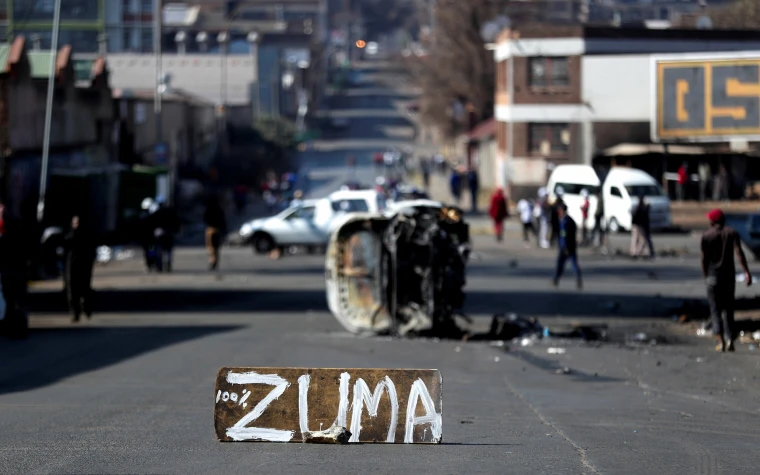In an unexpected turn of events, South Africa’s ruling African National Congress (ANC), the Democratic Alliance (DA), and the Inkatha Freedom Party (IFP) have agreed to form a Government of National Unity, pushing both Jacob Zuma’s uMkhonto weSizwe (MK) party and Julius Malema’s Economic Freedom Fighters (EFF) party to the sidelines.
The unexpected alliance comes as Zuma’s party hit the “self-destruct” button even before parliament had held its first sitting. The downfall of Malema’s EFF can be attributed to its checkered record as a coalition partner, particularly in Ekurhuleni Municipality, where its coalition with the ANC crippled service delivery and led to a crisis over uncollected waste. Additionally, in February, a meeting between the ANC and EFF to amend a vote of no confidence submitted against former Mayor Sivuyile Ngodwana came to a violent end after EFF and ANC members began exchanging blows.
The EFF circus ?@EFFEkurhuleni? are as usual disruptive and violent. This is how their public reps act in Council costing us a whopping R500k ?? pic.twitter.com/AhiStZ6bZs
— Michelle Dos Santos (@1MichelleDosSan) February 29, 2024
What You Need to Know:
Not only have South Africa’s political parties formed an alliance to limit MK’s power in Parliament, they have also sought to form a coalition in KwaZulu-Natal, Zuma’s home province, to unseat the MK which gained 45.94 percent of the vote in the region. With 45.94 percent of the vote, MK is just one seat short of ruling the province alone, and thus the ANC, DA, and IFP (who gained just 3.85% of the national vote) are seeking to recruit the National Freedom Party (NFP), a splinter party of the IFP, to join their ranks. The NFP, which holds just one seat in the province, has become kingmaker, although it has not yet officially stated to whom they will pledge their allegiance.
In terms of the MK’s “self-destruction,” they have copped yet another loss as a result of their attempt to interdict the first sitting of Parliament on Friday. Last week, Zuma stated that neither he nor his 57 MK members will attend Parliament due to the Independent Electoral Commission’s alleged collusion with the DA and ANC to “rig” the election. Zuma has also repeatedly called for a re-election, which has soured his relations with other parties who welcomed the results.
This morning, the nation’s Constitutional Court dismissed the MK party’s application to stop the first sitting of Parliament on Friday, claiming, “the applicant (MK) has not made out a case for the granting of an interim interdict as it has neither shown that it will suffer irreparable harm if the interdict is not granted, nor that the balance of convenience favors the granting of the interdict. The applicant has also misconstrued the relevant constitutional provisions it seeks to rely on. In addition, the applicant has not adduced facts to establish a prima facie case in respect of the relief it will seek in the main application.”
Aside from its legal woes is the MK’s meeting, or lack thereof, with the IFP party. The IFP announced this morning that it had engaged in negotiations with the ANC, DA, and the NFP, while a meeting scheduled between itself and the MK on Monday never materialized.
“The MK and IFP meeting was scheduled for [last] Monday afternoon. Our team had to wait for two hours and was informed that the delegation was running late. The IFP team dispersed; comrade Mkhuleko Hlengwa remained and waited for another two hours, but no one pitched… There are other attempts to meet the MK party, so we can engage them on the common cause,” said IFP President Velenkosini Hlabisa.
With just two days before the country’s National Assembly must elect a President, the pressure is on all parties to negotiate as best they can to ensure a preferable spot for themselves in the Government of National Unity. There are fears, however, over the repercussions of a possible unseating of the MK in KwaZulu-Natal, as the province has been the scene of mass Zuma-related violence in recent years.
So, What Now?:
Despite the possible inauguration of a Government of National Unity (GNU) on Friday, the country’s Foreign Minister, Naledi Pandor, told the Russian outlet Sputnik on June 10th that the nation does not intend to change its foreign policy. The statement comes as the DA, which has advocated for closer ties with the West, secures for itself an important seat within the GNU.
“We are not negotiating as a junior partner, but we are not behaving arrogantly either. But we are very clear on our foreign policy. There cannot be a South Africa that is negative or hostile towards Russia. Russia played a very important role in the freedom struggle by supporting the liberation movements. There cannot be an ANC-led government that is negative towards Russia in its foreign policy,” said Pandor, who lost her parliamentary seat in the country’s recent election.
Thus, while the inauguration of a GNU is certainly set to shake up domestic South African politics, it is not yet clear what effect the new government will have on the nation’s international relations.
Additionally, as negotiations are still ongoing, and there is likely much going on behind the scenes, far from the cameras of the media, much is up to chance in the next two days.

